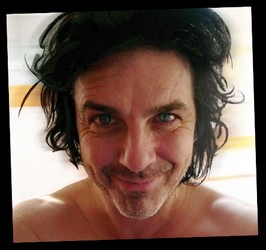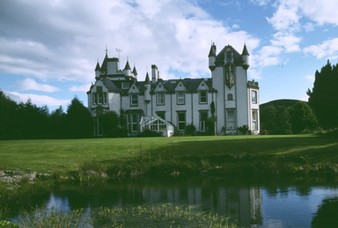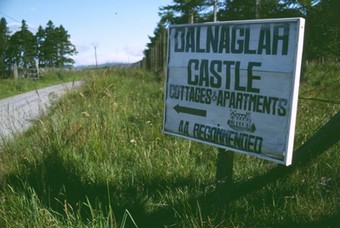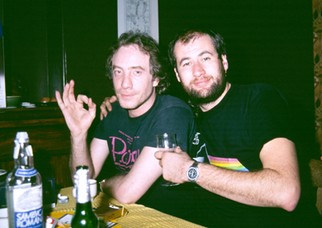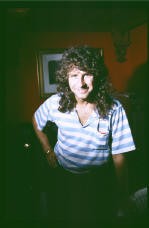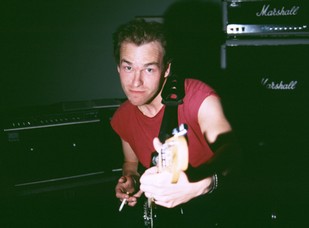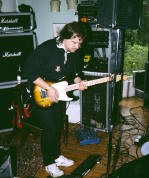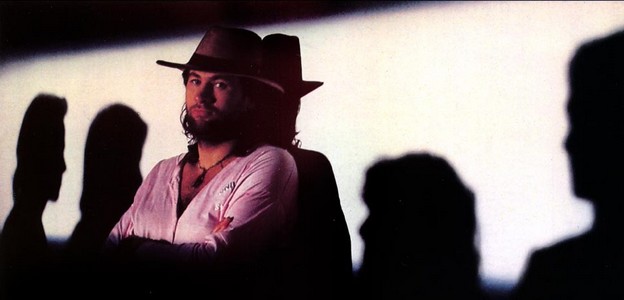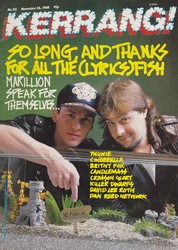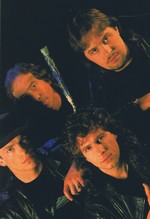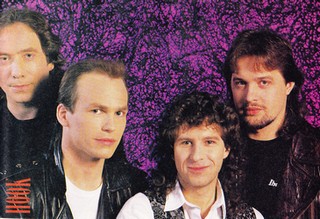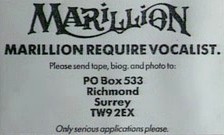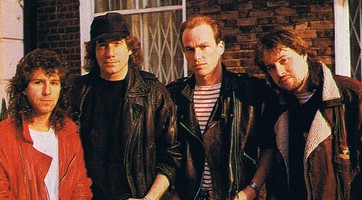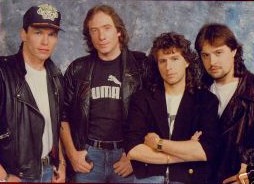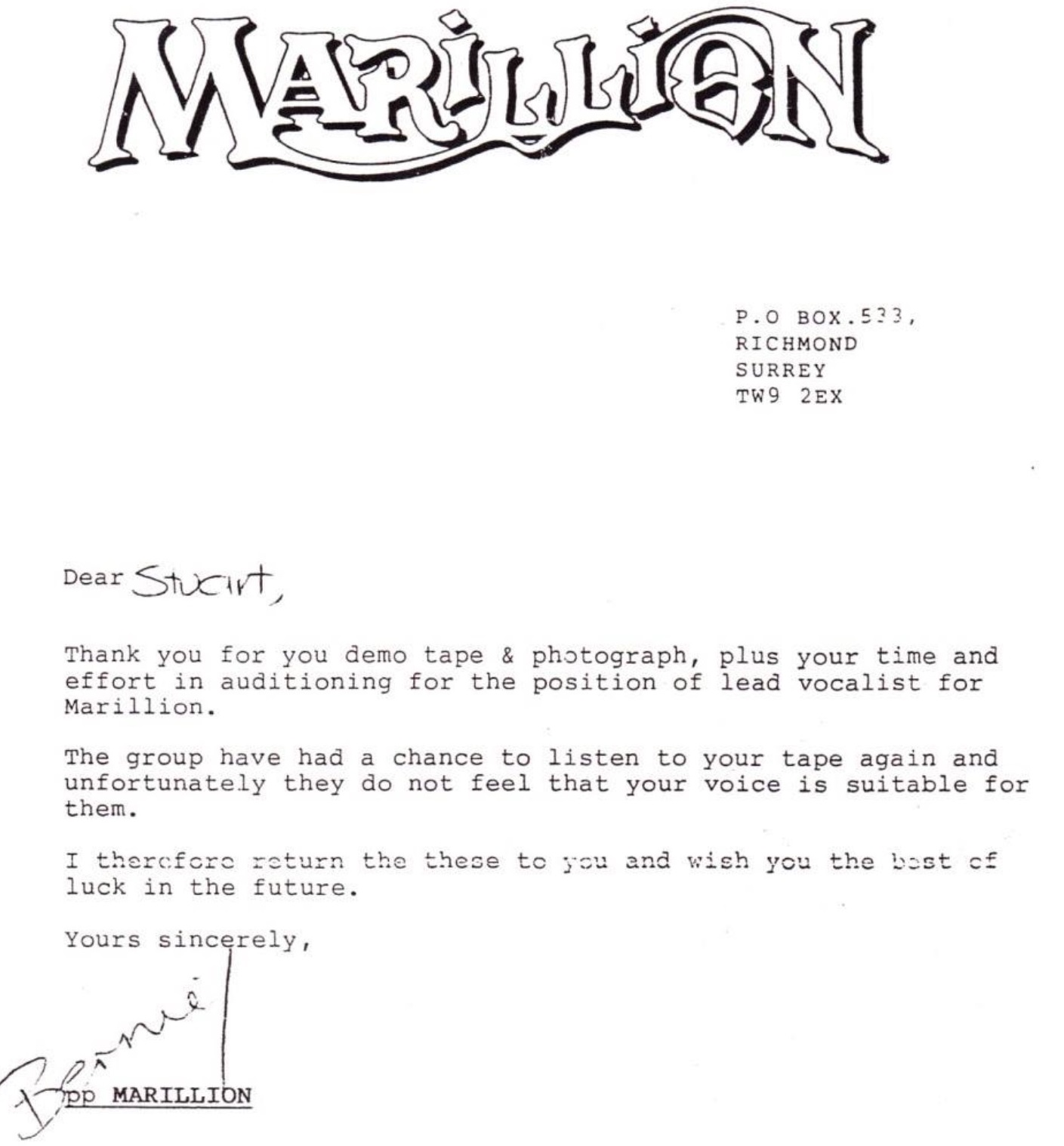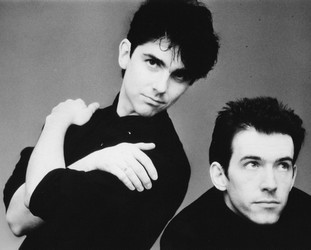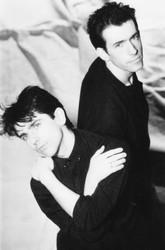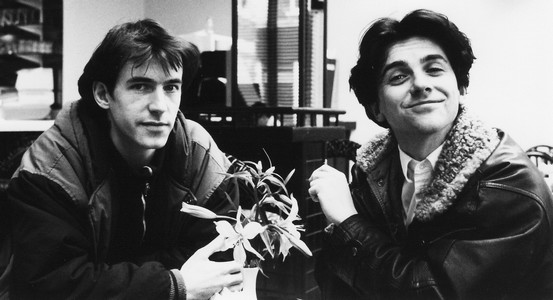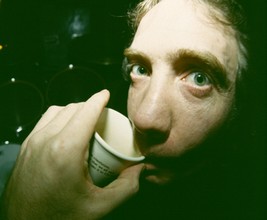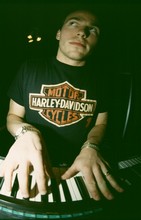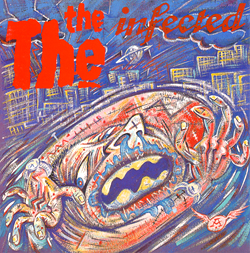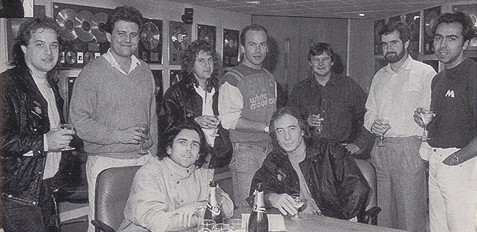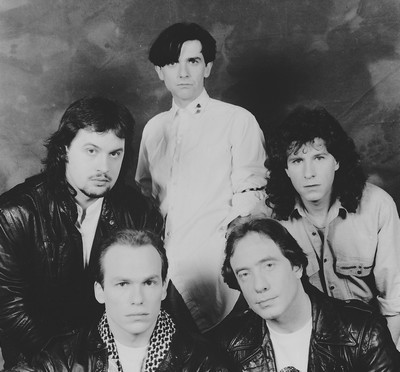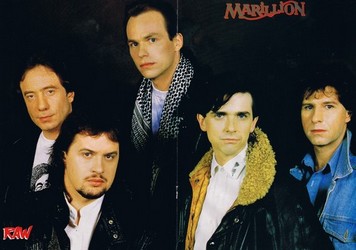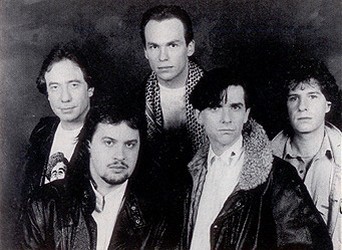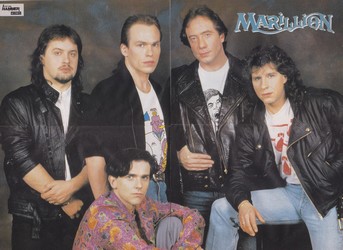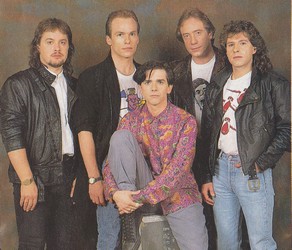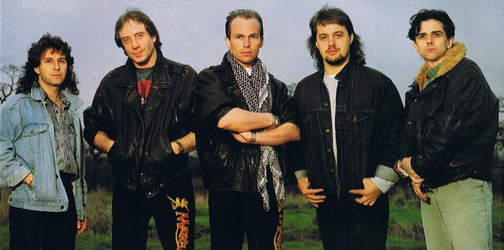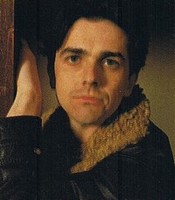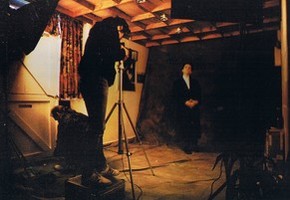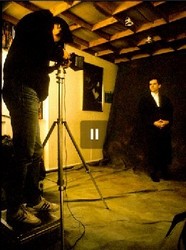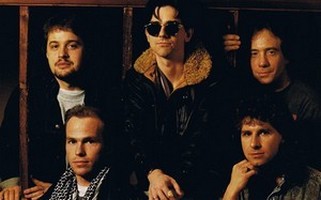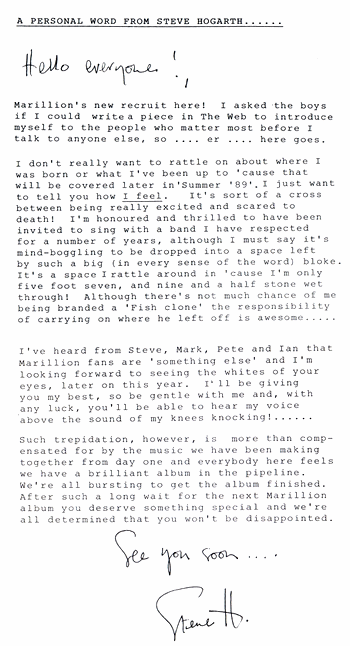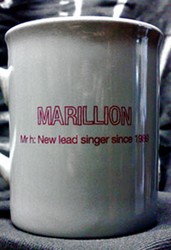|
|
“New Lead Singer since 1989” 25 years since Steve Hogarth joined Marillion
On 2nd February 1989, Steve
Hogarth officially joined Marillion. Here’s a collection of bits and pieces from
the press, fanzines, interviews, recollections and more from back in 1988/89,
charting how this happy union happened. I started writing this page back in 2009
with intention of “publishing” it for the 20th anniversary of Steve
and Marillion joining forces, but life
(happily) got in the way. So, here it
is just in time for 25... Hope
you enjoy it. Locked
in the Castle On
23rd July 1988, Marillion played
their last show of their ‘Clutching at Straws’ tour at ‘Fife Aid’, a ‘Live Aid-style’
charity gig in Craigtoun Country Park, St Andrews, Scotland. Shortly afterwards, the band made a start
on writing their next album, meeting in bassist Pete Trewavas’ garage
to try out new ideas. One of the concepts vocalist Fish had proposed was an album called
"Gheisterfahrer" about a man committing suicide in a car. The album would have featured cover
versions of songs that the man was hearing on the radio, all being relevant
to his life. The project was rejected by the rest of the band and shelved. Keyboardist Mark Kelly remembers: “On the days that Fish did decide to turn up he would
usually stay long enough to have a cup of coffee and tell us the music we
were working on was ‘shite' and then leave. To be fair, we were as
complimentary about the lyrics he showed us.” Pete recalls: “Fish no longer seemed to
like what we were doing musically. It wasn't happening.”
With a publishing deal worth
over a million pounds on the table, the band persevered and continued working
on new material. They booked into
‘Tone Deaf’ studios near Oxford and put down demos of the ideas they had up
to that point, namely ‘Sunset Hill’, ‘Tic-Tac-Toe’, ‘Shadows on the Barley’
& ‘Story from a Thin Wall’. These
demos appeared on the disc two of the 1998 remaster of ‘Clutching at Straws’
and are fascinating listen.
Essentially you are listening to familiar Fish ‘solo’ lyrics
(later used on the Vigil, Internal Exile & Suits albums) over the music
of Seasons End. Legendary Pink
Floyd producer Bob Ezrin was in
talks to produce the new album and sat in on some of these demo
sessions. He considered them only
‘bits of songs' and nowhere near ready to consider recording.
Mark
Kelly remembers: “At this point any sensible people would
have said let's take a few months off and recharge our creative batteries. We
didn't. Instead we went to Glenshee in Scotland and locked ourselves in a
castle.” The castle in question was called Dalnaglar, located in the
Highlands. “There was nothing for miles
around. No escape. We had to be together. We would get it written if it
killed us. It was a big castle, we didn't see a lot of each other.” Tour manager Paul Lewis describes the place being “six miles from the nearest pub and
sixteen miles from the nearest town.
We were sure this was the best recipe for hard work.” A few more ideas were written
& recorded at Dalnaglar: ‘Exile on Princes
Street’, ‘Voice in the Crowd’ (both on the Clutching at Straws 2CD also), ‘The
Uninvited Guest’ (with the lyrics for Fish’s
‘Lucky’), ‘Now Wash Your Hands’ (later on ‘Brave’), ‘Waiting on the Man’ (on
the Holidays on Eden 2CD), and the first half of ‘The Space’. Fish had also written lyrics for ‘Big
Wedge, ‘Vigil’ and ‘Internal Exile.’ “Distinctly Nationalist” he recalls “the
lyric had not gone down well and was felt to be too personal both politically
and emotionally for inclusion on a band project.” Drummer Ian Mosely remembers there being bad vibes at the castle: “The four of us were really quite fruitful
in the material we were writing, it was coming through really well, but Fish
just didn’t seem interested.” After
a month, there were odd signs of ‘the old spark’ and ‘a few things started to
gel’ but ultimately it wasn’t enough. Fish
explains “We left in disarray and headed back down south but only
after a night out in Edinburgh on a ‘bonding session' ended up with us all
separating and me getting a kicking off a bouncer while being drunk in charge
of a human being. I arrived back at the castle covered in blood and with a
nasty gash in my head. It was all over the papers. Great night out!” Guitarist Steve Rothery sums it up: “When
we came back and thought it over, it really wasn't happening. 2 or 3
good ideas out of 20 really wasn't enough.” Back home, there were attempts at further
writing sessions, but creative tensions, alongside Fish’s concerns over management were coming to a head and
something was going to break!
Pictures of Dalnaglar, Summer 1988 by Paul Lewis A Shot
in the Arm... On 16th
September 1988, Fish left
Marillion. He explained at the time:"I've had a brilliant seven years
with Marillion, however, recently, musical directions of the band have
diversified to such an extent I realised the time had come to embark on a
solo career." (Please see Fish’s
full explanation of why he left at http://www.marillion.com/music/albums/cas.htm
as I can’t summarise it all here) Looking
back with hindsight 10 years later, Fish
wrote: “we should have taken a year
off. I should have made my solo album and got it out my system while the
others followed their projects and we could have come back in ‘89 with a new
and fresh Marillion album. We all needed a break from each other and to
recapture our private and personal lives away from the band.”
Pete
Trewavas remembers: "Fish leaving was obviously a
difficult time, but (also) one of the turning points that made us stronger
and more determined.” Elsewhere he
explained that “the four of us had been
working on our own for a quite a while, while Fish was off doing other
things. So when he left, we just kept
going. It was best to split rather
than go on pretending everything was hunky-dory.” Steve
Rothery echoed this: "We
never really worried much when Fish left. We felt that the band had a
very strong musical identity, and we believed very much in what we wanted to
do. We never even considered the possibility of splitting up or
stopping what Marillion was. It was too much of our lives." Mark
Kelly explained at the time that “things
had been strained for a while, so it was actually a relief when he
left.” Far from killing the band, Fish leaving was about to make it
much stronger. “The split has been a shot in the arm” said Mark. “I can’t remember the last time I was so excited.” “Marillion
Require Vocalist” Mark Kelly: "There
was never any question of us not carrying on. Fish was the public face
of Marillion... but at the end of the day it is the music people listen to when
they buy a record - and we've still got our sound. It was the four of
us that made that sound!" Steve Rothery adds “When Fish left, it was like a huge weight being lifted off my
shoulders. The biggest feeling I
experienced was relief. We never doubted
that we could carry on”
In the meantime, the band put
together a double album of live cuts, ‘The Thieving Magpie.’ Released in November 1988, and compiled
from various shows throughout their career, it was seen as ‘thank you’ to the
fans, and bought the band a bit of breathing space. The four piece Marillion did the promotional rounds,
and also played at a couple of ‘fan club’ shows. Pete (ably assisted by the
audience) sang vocals at the Dutch ‘Freaks’ fanclub show in Utrecht, and Dave Lloyd (vocalist with the band
‘Rage’) filled in at the ‘Web UK’ show at Liverpool Royal Court. The
band put out an advert in the national music press:
They were looking for
something special, and were aware that it could take some time. Steve
Rothery said "We wanted to find somebody with whom we had a great
chemistry. Somebody who was very, very different from Fish. We
didn't want a Fish clone. Fish was a very hard act to follow. He
was a charismatic frontman and a great lyricist, and we knew it would be very
hard to replace him!" At the same time, the band was looking to
recruit a lyricist, should the eventual ‘new’ singer not be up to that
challenge. Ex-Pirahnas guitarist John Helmer was approached by Marillion’s management
with a view to writing some words, and even Viv Stanshall of the Bonzo Dog (Doo-Dah) Band was considered!
Over 150 people sent in
tapes, of which about a dozen were shortlisted and given the opportunity to
try out with the band themselves.
These few were auditioned at Nomis and Westside Studios. “We
had two (audition) tunes” remembers Mark
Kelly, “’The Release’, and ‘King of
Sunset Town’. We had some lyrics from John Helmer. It was a test
of their voice and their approach. It was amazing how different
singers, (when) given nothing but a semi-blank canvas, half of them can't
actually do it!" Pete Trewavas elaborates: "It
was quite obvious when we started auditioning people what they thought (they
knew what) we wanted. And none of them fitted the bill. We did
have some quite hysterical moments with people prancing around with make up
on. It wasn't a case of knowing what we wanted but knowing what we didn't
want!” The band had come across
some great voices, but not yet found the personality to fill the spot. Apparently, two singers to audition
were Nigel Voyle
from the band ‘Cyan’ and Stuart Nicholoson from ‘Galahad.’ Stuart recalls his audition at NOMIS studios: “We played Kayleigh, Lavender, Blue Angel,
Slainte Mhath, Forgotten
Sons and a lot of jammed new material with me frantically trying to find
lyrics that fitted the music. A
wonderful memory to keep and the guys couldn’t have been friendlier.”
Milkman
or Frontman? Steve
Hogarth formed How We Live with
guitarist Colin Woore after Europeans split
in 1985. They made an album at
Crescent Studios in Bath in 1986, released a handful of singles and secured a
support slot on Chris De Burgh’s ‘Into the Light’ Tour. They recorded two further tracks (‘Simon’s
Car’ & ‘You Don’t Need Anyone’) as a potential single release but nothing
came of this. Record company politics
and wranglings meant that the album (‘Dry Land’) was not released until 1987
and the band hit a wall. Steve and Colin
spent a further year writing and demo-ing tracks for a second How We Live album. These
included ‘Easter’ and a track called ‘Victoria Station’ that they were going
to record as a single with Paul Hardyman.
CBS Records was about to be
sold to Sony, and any bands on the roster that had yet to make a profit for
the label were being dropped. "That
was a very demoralizing experience" explained Steve. “I thought we made a good album but we got in to a
conflict with the MD (he said I couldn’t sing) and, for some reason, I don't
think he wanted it happen with us." “(CBS)
wrung every last bit of self esteem and confidence out of me, and I didn't
want to be musician anymore. I was in the process of jacking it all in,
selling our little house in Windsor. We were going to move to Derbyshire,
where back then you could buy some place for virtually nothing, and live a
quiet life and get real again.” Steve considered getting a job that didn’t
require him to think much, like a Milkman. “They are happy. They always whistle and seem to have enough. I
seriously thought about it.” “Just before Christmas 1988, I was in
the office of Rondor, my publishers, and asked if anyone had anything I could
do. I had no income and was completely
skint. It was in a groovy building on west London’s Parsons Green and I’d
have done anything at all. They had a demo studio in the basement where I’d
have been quite happy engineering their other acts. They told me that Marillion were looking
for a lyric writer and a singer, because Fish had left. Alan Jones, general manager at Rondor
persuaded Steve to send a tape. “So I reluctantly agreed...It really was
the last thing on earth that I needed.”
The cassette contained 3 tracks, ‘Games in Germany’, ‘Kingdom
Come’ and ‘Easter’ (although it might also have had ‘Burning Inside You’ on
it – Steve can’t really remember!) It was Marillion drummer Ian Mosely’s job to go down to the
office and pick up audition tapes of singers. “I used to put them in the
cassette player whilst I was driving out of Aylesbury to Pete’s and usually
listen to half a number and throw them into the back seat and put the next
(one) in.” However, Steve’s
tape made a more lasting impression: “I
opened the envelope and there was a photo of Steve Hogarth. I thought he was a good looking boy. I put the cassette in and it was ‘Games in
Germany’ and straight away I thought he had a great voice. There was something I could really identify
with in that track too. We sat down
and listened to the track as a band and straight away everyone said yes, ask
him along.” Steve Rothery agreed: "When we heard Games in Germany from Steve's tape it was
"Oh, intelligent lyrics, great vocal performance, a lot more of a
singer. It was obvious he was working in
a similar musical vein, and his voice seemed really quite distinct. It had
character.” Christmas happened and Steve had “kind of forgotten about it” when in January, Marillion’s
management phoned him up. “I was initially reserved about even
exploring joining the band because I didn't feel like I was the right guy for the job. I assumed that they
would want someone to replace Fish, and knew I wasn't able to do that. The
band literally had to pester me to do the initial rehearsal so I decided to
give it a try. The band heard my past works and liked my voice, lyrics, etc,
and wanted me to carry it over to Marillion.”
Supercharged On a Sunday afternoon in
early January 1989, Steve Hogarth
arrived for his Marillion audition At
Pete Trewavas’ house. He was a day late, as his car had been
stolen and he had been sorting all that out!
Furthermore, the band had to chat outside in the cold January air, as Steve is allergic to cats and Pete had two in the house. The garage had been soundproofed, and was
being used as a professional rehearsal space since before Fish had left. “It was just ridiculous, like all the gear in the world crammed into
an outside toilet” remembers Steve, “it was a bit like cramming into the back
room of a music shop." Steve
Hogarth explains how
it went for him: “They gave me a lyric
sheet and said 'We'll play this idea we've been jamming around, and do you
want to sing these words?' There wasn't a tune, they just told me to
make one up. So I took a deep breath, listened to what they were doing
and did it.” The song was ‘King of
Sunset Town’ and Marillion
were impressed! They also ran through
two older numbers, ‘Sugar Mice’ and ‘Incommunicado.’ “I knew most of the words to 'Incommunicado'” said Steve “but I didn't know the words to 'Sugar Mice', so I'd spent the day
before with the tape recorder learning the words.” Steve
Hogarth thought it “sounded like
hell... out of tune and horrible.” The four Marillion
boys instantly thought that they had found their man. “The minute Steve started singing, it was like out whole creativity
became supercharged again” remembers Steve
Rothery. "It had that same magic, working
together, that we'd had in the early days with Fish, and it was obvious to us
all, right from the word go, that this was the guy for the job. Once we started knocking some ideas around,
it was just so much more interesting than anything any other singer had done.” Pete
adds “It was very apparent that he was
able to walk up and make any microphone sound good. A lot of singers need help with technology
to get their vocals to sound good, but he just had such a good natural
ability” By the end of the audition, Marillion had
pretty much asked Steve to join
the band. Aware that it was a huge
thing to commit too, he asked for a week to think it over. "We felt strongly that he was the
person for the job but he didn't immediately say yes. He upped and went and thought about it,
which we found very surprising" said Steve Rothery. “I remember
being pissed off that he kept us waiting for a week while he made his mind
up” recalls Mark Kelly. “Knowing him now, I know why, ‘cause he
tends to deliberate everything carefully, even though he thinks
instinctively.”
“The least
credible and fashionable band in the universe” It turns out that Steve was
considering a counter offer! Matt Johnson from the band ‘The The’
had been in touch, asking if Steve
wanted to join his band, playing piano on his forthcoming ‘Mind Bomb’ tour,
alongside ex-Smiths guitarist Johnny
Marr. Steve had played piano on the ‘Infected’ album, and had enjoyed
the experience, so was very tempted. “I quite fancied that, as I would have a
lot less responsibility and I could just get back to enjoying playing again,
which was what I needed after a couple of years being signed to CBS. I’d be at the back, out of the way; there
would be nothing expected of me.” “I
couldn't get arrested at Christmas, by January I had two incredibly exciting
offers sitting on the table. I didn't know which way to jump. It was a bizarre decision to face. Do
you want to play piano for the most ultra-cred and fashionable dude in the
universe, or do you want to be the singer for the least credible and
fashionable band in the universe? It was bizarre for the same person to
be offered both these jobs at once!"
Meanwhile, Marillion were
sure they had found their man and didn’t want to lose him. Ian
Mosely was friends with ex-Curved Air guitarist Darryl Way, who happened to be Steve Hogarth’s drinking buddy in Windsor. Ian explains “I rang
Darryl up and told him that we really wanted Steve to join the band and I
asked him if there was anything we could do.
Can we send his wife some flowers?
I think he might have had a word with Steve!” Darryl certainly did have a word: “I thought that this was just the right thing for him to do at this
stage in his career, especially as he had a young family to support.” After a week or so of
deliberation, Steve decided. So what swung it for Marillion? He
explains “A whole load of things, first
of all meeting the boys, they're really nice people. Matt from 'The The' is
very intense, he's not much fun. What really swung it, the hard headed part
was that it was really the difference between going and playing for somebody
for seven months then saying goodbye or becoming part of something that would
be as much about me as anything else. I'm a creative person, and this was a
chance to weld myself on to Marillion, instead of
just working for somebody. The
attitude Marillion had towards the future was
fantastic. They just said look, we've heard what you do, we've heard the
songs you've written and we love them. And we want to do what we do, and we
want you to do what you do. “ On Trial
in Brighton Pete
Trewavas explains what happened next: "We thought it sounded like it was
working, he seemed like a nice bloke and we'd done some homework - we knew The Europeans and How We Live. We
thought what we should do next is have a couple of weeks away and work on
some stuff." The boys booked into a residential rehearsal studio in
Brighton called ‘The Music Farm’ (or ‘The Mushroom Farm’) to see if it would
work, professionally and socially! A
handful of these demos appeared on the 2CD remaster of ‘Seasons End.’ The Winter ’88 edition of the Web UK
fanzine reported that “the group are
locked in a rehearsal studio with Steve Hogarth. Some of you might
remember him in a small group called The Europeans.
At the moment all appears to be going well, however, no final decision has
yet been made so I cannot confirm either way.” “At
this point, I wasn't officially part of the band” says Steve Hogarth, “I guess I
was ‘on trial', although I wasn't made to feel so. During the day we would jam and record, and
at night when we'd had enough, we'd either stay in and play pool whilst
listening to the day's jams, or we'd drive into Brighton and find a viby
place to get slightly sloshed and talk rubbish! I grew to love the boys in a
very short space of time.” Pete
looks on that time fondly: “For two
weeks we worked, slept and breathed the songs that would become the album. We
would put together song arrangements during the day and record them in
various forms on 8 track. (At night) we’d play pool and listen to the day’s
events all evening, making comments on the way and the next day we would
either improve on them or move onto another song. We started with music that was already written
( Season's End, Berlin) and got onto new things like Holloway Girl, with
Steve's bucket of material joining in when possible.” This ‘trial’ period
was very productive, with 6 songs written in 7 days. "Everything
gelled socially and musically. I could tell straight away that that we
were doing was strong, and it would be a very strong album" remembers Steve. He was in! Joining
& Partings In late January 1989, Steve Hogarth joined
the band. He officially signed with
EMI on the 2nd February.. The band brought Steve in on the same financial terms as them. "It all seemed very, very fair,
especially considering they were already famous selling bucket loads of
records and I wasn't!"
A handful of promo shots of the new line up were
taken (by George Chin & Ray Palmer) whilst the band rehearsed down in
Brighton. These
photographs featured Steve in a
floral shirt and with a “floppy haircut”, something that die-hard Marillion fans
weren’t initially at ease with! "I'm
glad this worried them” says Steve. “It's
good to shake them up a bit! I tell you what was interesting about this
shot and that this was the first time since I was about seven years old that
I had a side parting! I think that was a brainstorm that happened on
the morning of the shoot that I wish hadn't happened! I'd been in the
band about 3 weeks and we'd already got quite well into the writing of the
new album. But that is an awful photo."
And lastly... Steve wrote a small piece in the
Spring 1989 issue of the ‘Web UK’ fanzine. He sets the scene “When I joined I wrote a letter in the fan
club magazine announcing myself and telling everybody that I wasn't here to
impersonate Fish, I was here to be myself. I also said I would be giving 100
per cent to help make this version of Marillion happen for
them. And that's basically how I feel." Here it is.
Bibliography This page was complied over a
number of years from a multitude of sources, including magazines, fanzines,
online interviews, videos, liner notes and more. If I have not credited you, and
you would like me to, then sorry, and please get in touch! ·
Marillion - From Stoke Row to Ipanema DVD available at http://www.marillion.com/music/dvd/stokerow.htm ·
Power Hour (UK TV Programme) August 1989 ·
Metal Hammer Magazine: "Summer Season" by Mark
Day, 18th September 1989 ·
Marillion / Separated Out - The complete history
1979-2002 (plus 2013 Redux edition) by Jon Collins ·
Sounds Magazine: "End of the Fishing Season" by
Paul Elliott, October 14 1989 ·
Classic Rock No 68: "Men for All Seasons" by
Jerry Ewing, July 2004 ·
The Web (Marillion fanzine)Winter 1988, Spring 1989,
Summer 1989, Spring 1995 + probably more ·
Rock World Magazine 1989 & 1990 ·
“Marillion name the new man” – Kerrang, Feb 1989 ·
Countdown Cafe 08/09/1989 Music Harmony show ·
Countdown Cafe Interview 11/11/88 ·
Spawn Free - Kerrang 1988 Dave Dickson ·
And Then there were Four - Jon Hotten,
Kerrang 215 Nov 26 1988 ·
Q Magazine Aug 1989 ·
1997 Big Bang Magazine ·
Rock Notes On-Line
September 8, 1998 ·
Metal Hammer - Own Words by Mark Day ·
Raw - back in business 1989 ·
H Anoraknophobia Radio Interview (5 October 2000) FM 107
Falcon ·
Best of Both Worlds - lyric book ·
Eden Magazine - Rogues Gallery -Interview with Steve
Hogarth by Dave Ling ·
Classic Rock May 2007: Jon Hotten "From Season's to
Somewhere" http://www.marillion-anoraks.com/ ·
http://www.docstoc.com/docs/5593680/Learning-Circle-MWH1--%E2%80%93-Spring-2007 ·
Record Mirror Dec 17th 1988 – The Men who let Fish off
the Hook by Pete Cronin ·
MM Oct 14 1989 ‘Marillion – Catch their Fall’ by the Stud
Brothers p11 ·
Sounds April 1 1989 p4 Marillion’s New Voice ·
The Web – Interview with Ian Mosely June / September 2010
Andy Rotherham ·
Fish ‘Songs From the Mirror’ Liner notes ·
http://www.aylesburyfriars.co.uk/interviewsmarkkelly.html |
|
Tim Glasswell February 2014 |
Main / News / History / Discography / Interviews / Gigs / Songs / Articles / Video / Sounds / Links
